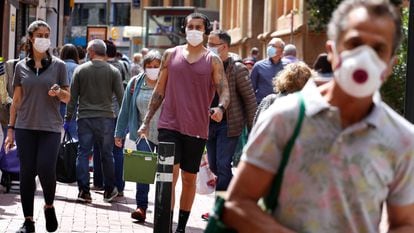Obligatory use of face masks in Spain: What you need to know about the new rules
From Thursday, the personal protective equipment must be worn in all public spaces – open and closed – where social distancing cannot be respected
/cloudfront-eu-central-1.images.arcpublishing.com/prisa/JVVXJ7IVKFC4VNA4FUDUWQCQV4.jpg)
The Spanish government released on Wednesday the new rules concerning the obligatory use of face masks in public spaces. The personal protective equipment has been compulsory on public transportation in Spain since May 4, when confinement measures were eased to allow residents to go outside for exercise and for walks. But on Sunday, the central government and regional leaders struck an agreement to extend their use to all public spaces where social distancing cannot be respected.
According to the ministerial order, published Wednesday in the Official State Gazette (BOE), face masks must be worn in the “public street, in open-air spaces and any closed space that is for public use or that is open to the public, where it is not possible to maintain [an interpersonal] distance” of two meters.
The new rules apply to everyone over the age of six. The use of face masks is also recommended for children between three and five years of age.

The measure comes into effect on Thursday and, in principle, will be valid for the duration of the state of alarm, which is set to end on May 24 if the government does not secure congressional approval today to extend the extraordinary measure until June 7.
But there are exceptions to the new rules. According to the order, people with respiratory problems, or those who cannot wear masks for other health reasons or due to a disability, are exempt from wearing them. The order makes exceptions for cases where wearing a mask is incompatible with carrying out activities, due to the nature of the activity. The Health Ministry confirmed to Spanish radio station Cadena SER on Wednesday that running falls under this exception. This means that people do not need to wear a mask while going for a jog. The order also sets out exceptions for instances of “force majeure.”
Health Minister Salvador Illa announced on Wednesday that the central government will not be handing out masks to the public for free. Regional authorities may, however, decide to take this initiative. In Madrid, seven million face masks were distributed for free last week, although complaints that they did not meet European Union regulations and that they were not the correct type for use by the general public.
The order does not set out what type of protection must be worn. Instead, it recommends the use of “hygienic or surgical masks that cover the nose and mouth” in public spaces where social distancing is not possible. The central government has set the maximum cost of surgical masks (the most common type are blue on one side and white on the other) at €0.96 a unit. If a single-use surgical mask were to be used every day, the cost to each citizen would be around €29 a month. There are, however, surgical masks that can be worn for more than one day.
The new rules do not establish specific sanctions for those who refuse to wear a mask. Legal sources believe that, like the rest of the orders under the state of alarm, offenders will be subject to the Public Safety Law, also known as the “Gag Law.” Under this law, a person can be fined between €100 and €600 for minor breaches, and up to €600,000 for very serious offenses.
The issue of face masks has been one of the measures that has been subject to the most variations since the health crisis began. At first, authorities did not recommend that they be worn by people with no symptoms, then they did a U-turn and recommended that they should be used, before finally deciding that face masks would be compulsory on public transportation.
The change has coincided as more information is gathered about the coronavirus, and as Spain begins to deescalate the confinement measures that have been in place since March 14. With more people in the street, there is a greater risk of contagion, explained Fernando Simón, the director of the Health Ministry’s Coordination Center for Health Alerts. Another change is that there is now greater availability of face masks. Indeed, the Health Ministry announced on Wednesday that it had distributed 9.6 million masks among Spain’s regional authorities.
Do masks need to be worn while exercising?
Simón explained that if a person was carrying out a sport that required “an excessive effort” that could not be done while wearing a mask, not using one would “not have to be a big problem.”
English version by Melissa Kitson.
/cloudfront-eu-central-1.images.arcpublishing.com/prisa/YBHSTHVJ4GEI3IJTBR3S6UNHSE.jpg)
/cloudfront-eu-central-1.images.arcpublishing.com/prisa/OAS62CFEQBHHHPAMUCUX4IFH7E.JPG)










































